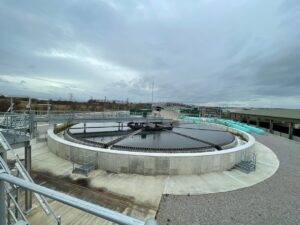Smart Utility Network Helps City Reduce Annual Water Loss

19911914 - panoramic view of town square in dallas, georgia, after sunset
“It was clear early on that our water loss control initiative would pay off well into the future, so we jumped at the opportunity to understand what more we could do,” said City of Dallas Billing Clerk Amber Whisner.
Challenge: Upgrade metering infrastructure to reduce non-revenue water
Non-revenue water is an industry-wide issue and state government regulations also started putting more pressure on the city to conserve resources. “Georgia is at the forefront of movements happening across the country to improve sustainability,” said Whisner. “Every utility in our state is now required to have a water loss control program and submit yearly audits to show results.”
The city decided to expand their metering upgrade program to address water loss. They chose to deploy a smart utility network from Sensus, a Xylem brand, as the next step in their journey.
Solution: Deploy a smart utility network for real-time remote meter monitoring
With an aggressive, five-year timeline, the City of Dallas expanded the rollout of Sensus iPERL residential water meters and added OMNI commercial meters to their arsenal. Backed by the secure, two-way FlexNet communication network for real-time remote monitoring, the city was able to quickly address leaks. “We could resolve issues within hours that might have taken us 30 days to even identify with our old system,” said Whisner. “The network helped us make a major dent in water loss and improved billing accuracy for customers.”
The value of the system became more apparent as the city continued the rollout. “It didn’t take long for the entire system to pay itself off in terms of the money we saved from reducing water loss,” said Whisner. “Within one year, we eliminated 12 million gallons of lost water.”
Reaching farther: Add pressure monitoring to advance water loss control program
Hungry to see what else was possible, the city’s water team began looking for other ways to advance their water loss program. The city launched a pilot program with Sensus ally water meters combined with Sensus Analytics for enhanced pressure monitoring across residential accounts in three targeted zones or district metered areas (DMAs). “It was the next big step for us to take to combat water loss,” said Whisner. “We were able to get more data from our system and gain better visibility into the water cycle.”
The solution allowed staff to pinpoint issues beyond leaks, such as a broken main or open hydrant. The city also analyzed data to catch background leakage. “Data analytics helps us identify areas with leaks that we can’t visibly see underground due to small cracks or pipe deterioration,” said Whisner. “Adjusting the water pressure in those areas can help address any issues and it also protects our infrastructure over the long run.”
A universal challenge during the COVID-19 crisis
The City of Dallas’s latest challenges are one that many municipalities are dealing with amid the COVID-19 crisis – keep essential services flowing and maintain workforce safety. The city’s smart utility network allows remote operations and ways to connect with customers while following social distancing guidelines. “We’ve joined residents in taking measures to help flatten the curve,” said Whisner. “Having our remote system in place helps us provide service to customers even if we’re not in the office.”
The city remains committed to advancing their water loss control program with bold goals for the next part of their journey. “We’re aiming to reduce annual water loss from 47 million gallons lost per year to less than 10 million gallons within the decade,” said Whisner. “That’s an ambitious goal for a utility, but we have the infrastructure in place to make it happen.”
Source: Xylem Inc.




